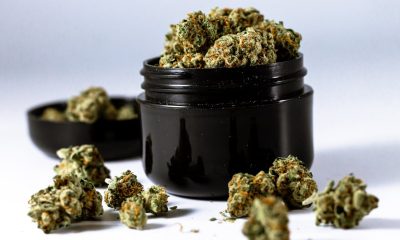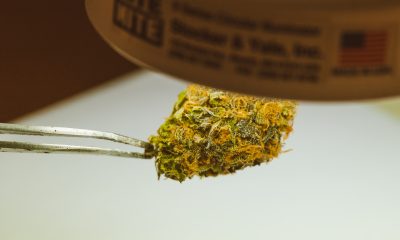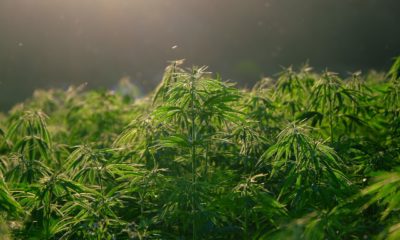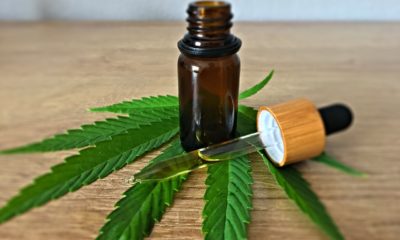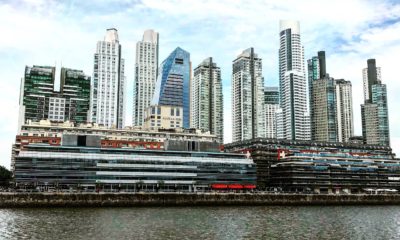Cannabis
Argentina Might Pass into Law the Industrial Production of Cannabis Before the End of the Year
There is consensus in the blocks of the Frente de Todos y de Juntos to approve the creation of the Regulatory Agency for the Hemp and Medicinal Cannabis Industry in Argentina. If it is not dealt with before the end of the year, the project will have to go back to the commissions. If the law is passed, by 2025 Argentina could have generated 10,000 jobs in this new industry.

The cannabis industry in Argentina will be legal before the end of the year. The Chamber of Deputies will deal with the bill sent by the Executive Power to the Senate, which has already been approved. Unless an unexpected political dispute occurs in the last days, the debate would be on Tuesday, November 30th, the following day, December 1st, or in the sessions of the following week.
“It comes out for sure,” confirmed to Infobae from the command of the Frente de Todos bloc. “We support the cannabis law, there is no problem with that,” admitted a source from the Juntos interbloc. The political forces will define in these days when, but the consensus for it to be dealt with in the Lower House and to be approved before the opinion signed by the Agriculture and Budget Commissions loses its validity is there.
Of the 34 present at the Agriculture and Livestock Committee meeting, 25 voted in favor of moving forward with the “Regulatory Framework for the Development of the Medical Cannabis and Industrial Hemp Industry” project, as it arrived from the Senate last July. The project had the unanimous support of the 17 legislators of the Frente de Todos and six of the Juntos block (four from the UCR and two from the PRO).
Except for specific opposing positions, the opposition is interested in the law moving forward, with the solid support of the governors of Jujuy, Gerardo Morales, and of Corrientes, Gustavo Valdés, who need this new law to expand and promote the industrial cannabis projects they have in their respective provinces. Morales, in fact, is on a trip to Spain motivated, among other reasons, to close agreements that will allow him to export part of the production of Cannava, the public company of the State of Jujuy that already manufactures CBD oils.
Read more about the legalization of cannabis in Argentina and find the latest cannabis news in the world with the Hemp.im mobile app.
The law provides for the creation of the Regulatory Agency of the Hemp and Medical Cannabis Industry
The Frente de Todos bloc is trying to consolidate the quorum for some of the sessions to come: on December 30th, 1, 8 (holiday) or the following day, in what would be the last of the year before the reconfiguration of the Chamber with the assumption of the legislators elected in November. If the bill is passed for next year, it will have to go back to the committees and update the signatures for the opinion.
The difficulty lies in the positions of the Juntos bloc with respect to other bills, especially the Containers bill and also the Land bill. “We want to guarantee the quorum, we want to reach a consensus so that it is approved, the session is necessary so that the opinion does not fall. We are working for that”, commented a source of the official block, which does not have its own quorum.
“The important consensus that the bill had with the governors of different political backgrounds in the presentation made at the Economic and Social Council, as well as the half sanction in the Senate and the opinion of the commissions now in the Chamber of Deputies indicate that Argentina will have a regulatory framework for the medical cannabis industry and industrial hemp before December 10”, commented to this media the porteña deputy Mara Brawer, one of the promoters of the project in the lower house.
“The issue is packaging and setting up a session next week, which would be the last one. Unless the idea of holding a session on the 8th holiday or on the 9th prospers,″ commented from the main opposition block, where they believe that “the most logical thing” would be to hold a session before December 10th with the issues on which there is consensus. Among these is that of industrial cannabis.
The law provides for the creation of the Regulatory Agency of the Hemp and Medical Cannabis Industry (ARICCAME), which will have technical, functional, and financial autonomy and jurisdiction throughout the national territory. It will be the competent body to regulate, control, and issue administrative authorizations with respect to the use of seeds of the plant, cannabis, and its derivative products.
“The purpose of the present law is to establish the regulatory framework for the chain of production and national commercialization and/or for export purposes of the cannabis plant, its seeds, and its derived products affected to medicinal use, including scientific research, and industrial use; thus promoting the national development of the regulated sectorial productive chain,” says the project developed under the orbit of the Ministry of Productive Development, in charge of Matías Kulfas, since 2019 and elaborated throughout 2020 within the Council for Structural Change. It included the contribution of scientists from the Conicet, cannabis organizations, businessmen interested in investing in the sector, and legislators from both chambers.
The government of Alberto Fernández aspires to make the country a regional leader in the industrial cannabis business. Kulfas repeats that the agricultural and scientific-technological capacities of a nation with a tradition in the agricultural industry and prestige in its researchers of the Conicet or the INTA provide confidence for the sector worldwide.
“We need a law to legalize the production and development of the industry subject to the recommendations of the United Nations and pioneering countries in this, such as Israel or Canada. The regulations aim to avoid diversions to the illegal market and guarantee the traceability of the products, especially those for medicinal use. This will also allow us to have a quality product. Today what we see in the international market is an enormous price variability, and if we enter with a quality country brand, we will enter with good prices”, explained Kulfas to the deputies at the meeting of the Agriculture and Livestock Commission. He considered that the ban on the variety of the plant used industrially, which has been in force in Argentina since 1977, is “unfair” and must be changed urgently to develop a new productive matrix.
With the new law, it will be possible to use the cannabis plant in an integral way to produce not only medicinal oils and creams but also cosmetics, textiles, auto parts, construction materials, superfoods (rich in Omega 3 and Omega 6), slippers, eyeglass frames, among many others.
The Agency will be responsible for regulating and regulating the import, export, cultivation, industrial production, manufacture, marketing, and acquisition of seeds, plants, green material, and other derivatives. In relation to seeds, ARICCAME will work together with the National Seed Institute (INASE) to issue special resolutions for the registration of locally produced genetics. Until now, the only way to obtain seeds was by import, which made research and development very difficult also due to the hindrance of the drug law, which considers the seed a narcotic drug. This has already changed. Many of the foreign seed banks are already working on the installation in Argentina. Local organizations, such as Criacann (born out of activism), have also started to develop “national industry” seeds. At the last Expo, held in October at La Rural, the leaders of this cooperative gave national seeds to Kulfas.
“Our country has clear comparative advantages for the development of medical and industrial cannabis. As a result of its agro-industrial status, Argentina has significant scientific and technological capabilities in agriculture (including the genetic development of seeds, a key link in the cannabis chain). It also has favorable climatic and soil conditions, and has an extensive network of national (public and private) and transnational laboratories that have shown interest in researching the properties and applications of cannabis”, says the draft bill in its presentation to Congress.
The Government repeats that its objective with the law is to encourage the industry with small producers and cooperatives through special procedures for authorizations, social fees for access and technical support, among other forms of accompaniment. The regulation of the legislation foresees a special program of adaptation to these enterprises for non-profit cannabis organizations that in recent years have developed knowledge and experience in the therapeutic uses of the plant, such as Criacann or Mamá Cultiva, among others.
The industrial cannabis law will mean the complement for the 27.350 law that regulates medicinal use since this does not contemplate the production of oils, creams, tablets, aerosols, or tinctures that have therapeutic application and, although it allows the use and personal cultivation for patients, it is only limited to research and development of companies or institutions.
“A regulatory framework that regulates the production, industrialization, and commercialization of products derived from cannabis for therapeutic purposes will contribute to disrupt the informal market of oils and other irregular herbal preparations that currently exists”, states the Executive Power in the message that precedes the draft bill’s articles.
“The law of medicinal use did not guarantee access to health for patients, it did not guarantee production for entrepreneurship, the law is missing a part and that part is this law, which gives permits to grow, market, export not only medical cannabis but industrial hemp. It is a regulation for productive development, central because otherwise, families had to import products from Uruguay, Chile or turn to solidarity growers or growers who charge illegally, with products that may not have the quality standards”, explained Carolina Gaillard (FdT) from Entre Ríos in the committee meetings of Deputies, weeks ago.
“We are fulfilling Belgrano’s dream but in the 21st century. The whole plant can be used, different derivatives can be produced, from the root through the stem, the leaves. We can make bioplastics: Mercedes Benz, Audi, BMW, and Lotus make auto parts with hemp. It can replace fiberglass as an insulator against cold, heat, and humidity, which is why they also make beds for livestock. You can make paints, solvents, bricks, it has an enormous productive capacity and a negative carbon footprint, therefore it meets the objectives of sustainable development”, explained Brawer in that meeting that ended with the signing of the ruling.
In a “conservative” estimate, the national government estimates that, if the law is approved, by 2025 Argentina could have generated 10,000 jobs in this new industry, $500 million per year in consumption and domestic market movement, and $50 million in exports per year.
__
(Featured image by Ximena-c via Pixabay)
DISCLAIMER: This article was written by a third party contributor and does not reflect the opinion of Born2Invest, its management, staff or its associates. Please review our disclaimer for more information.
This article may include forward-looking statements. These forward-looking statements generally are identified by the words “believe,” “project,” “estimate,” “become,” “plan,” “will,” and similar expressions. These forward-looking statements involve known and unknown risks as well as uncertainties, including those discussed in the following cautionary statements and elsewhere in this article and on this site. Although the Company may believe that its expectations are based on reasonable assumptions, the actual results that the Company may achieve may differ materially from any forward-looking statements, which reflect the opinions of the management of the Company only as of the date hereof. Additionally, please make sure to read these important disclosures.
First published in infobae, a third-party contributor translated and adapted the article from the original. In case of discrepancy, the original will prevail.
Although we made reasonable efforts to provide accurate translations, some parts may be incorrect. Born2Invest assumes no responsibility for errors, omissions or ambiguities in the translations provided on this website. Any person or entity relying on translated content does so at their own risk. Born2Invest is not responsible for losses caused by such reliance on the accuracy or reliability of translated information. If you wish to report an error or inaccuracy in the translation, we encourage you to contact us.

-

 Cannabis1 week ago
Cannabis1 week agoAurora Cannabis Beats Expectations but Faces Short-Term Challenges
-

 Crowdfunding5 days ago
Crowdfunding5 days agoSavwa Wins Global Design Awards and Launches Water-Saving Carafe on Kickstarter
-

 Biotech2 weeks ago
Biotech2 weeks agoAsebio 2024: Driving Biotechnology as a Pillar of Spain and Europe’s Strategic Future
-

 Business10 hours ago
Business10 hours agoDow Jones Nears New High as Historic Signals Flash Caution
